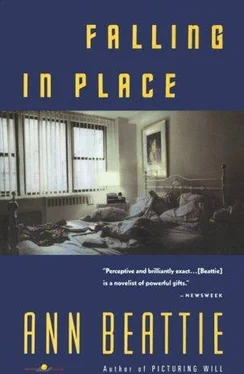Ann Beattie - Falling in Place
Здесь есть возможность читать онлайн «Ann Beattie - Falling in Place» весь текст электронной книги совершенно бесплатно (целиком полную версию без сокращений). В некоторых случаях можно слушать аудио, скачать через торрент в формате fb2 и присутствует краткое содержание. Год выпуска: 1991, Издательство: Vintage, Жанр: Современная проза, на английском языке. Описание произведения, (предисловие) а так же отзывы посетителей доступны на портале библиотеки ЛибКат.
- Название:Falling in Place
- Автор:
- Издательство:Vintage
- Жанр:
- Год:1991
- ISBN:нет данных
- Рейтинг книги:4 / 5. Голосов: 1
-
Избранное:Добавить в избранное
- Отзывы:
-
Ваша оценка:
- 80
- 1
- 2
- 3
- 4
- 5
Falling in Place: краткое содержание, описание и аннотация
Предлагаем к чтению аннотацию, описание, краткое содержание или предисловие (зависит от того, что написал сам автор книги «Falling in Place»). Если вы не нашли необходимую информацию о книге — напишите в комментариях, мы постараемся отыскать её.
Falling in Place — читать онлайн бесплатно полную книгу (весь текст) целиком
Ниже представлен текст книги, разбитый по страницам. Система сохранения места последней прочитанной страницы, позволяет с удобством читать онлайн бесплатно книгу «Falling in Place», без необходимости каждый раз заново искать на чём Вы остановились. Поставьте закладку, и сможете в любой момент перейти на страницу, на которой закончили чтение.
Интервал:
Закладка:
“One to do it and three to write books about it.”
“You think that’s funny? You should work with women today,” John said. “You will. You’ll get your chance.”
“I think that one thing women don’t like is having men generalize about all women,” Louise said.
“Women don’t like anything.”
“Not even nice soapy dishwater and darning tiny little booties?”
“Where’d you learn the snappy comebacks? Exercise class?”
“Pay no attention to me,” Louise said. “Women go crazy during their periods.”
“At least you’re not so crazy you’re pregnant.”
“I impregnated myself the other three times,” Louise said, “but now I’ve learned my lesson. I won’t do that again all by myself.”
“Dad, look! Is that a snake? Is that a crushed snake?”
“Look at the shape of it. Does that look like a snake to you?”
It was a squashed frog, with a wasp hovering over it. A bee joined the wasp. The frog had been recently squashed.
“Don’t just stand there, John Joel. Come on,” Louise said.
“He’s too fat to walk anymore,” Mary said.
“I got through to you very well when I spoke to you a minute ago, didn’t I?”
Mary lifted a strand of hair from behind her ear, stroked it and twisted it around her finger. She wished she had hair that hung in long waves and curls like Peter Frampton’s girlfriend’s. She had just seen a picture of the two of them at a Hollywood party. Their hair was more noticeable than it might have been because the photographer had gotten so close to snap them that their features had been washed out. It was almost like looking at people without faces, but Peter Frampton’s expression, however faint, was unmistakable: the expression on the poster. Peter Frampton and his girlfriend — the paper identified her only as his “lady love”—would have thought that this scene was hopelessly bourgeois. If Peter Frampton went on a picnic, Mary was sure that he went naked, in a speedboat, to some private island at midnight, with the lady love and a bottle of champagne. He wouldn’t be seen dead in a button-down shirt hanging out of a pair of baggy jeans, with a bag full of things to have a barbecue with and a wife and three children trailing behind him. On Peter Frampton’s picnic, he would want to pour champagne on the lady love’s nipples and lap off the sweet, tiny bubbles; he wouldn’t want to find out how many feminists it took to change a light bulb.
She had bought a pen and ink and a book about calligraphy so that she could write a love letter to Peter Frampton.
Stupid Lost in the Forest had had a tantrum when nobody had any idea why Becky had thrown away the dictionary in the first chapter of Vanity Fair . “You probably think that getting rid of a book that heavy would just be common sense,” she had said. She had threatened to make them write essays called “What I Did with My Summer.” Even Lost in the Forest, much as Mary hated to admit it, was probably having a better summer than she was. She was on her own, and if her parents were somewhere having a barbecue, she didn’t have to go along. She could stay home and read one of her precious books and understand every word of it. Even reading a book would be better than coming to the park on Friday evening and eating hot dogs, with mosquitoes closing in as it got dark, and nobody with anything to say. Her father was deliberately walking them this far on the path by the side of the access road so they would be tired when they got to just the place he wanted them to be, and nobody would talk, and he could read the paper and listen to the radio. Her mother knew it, too. Her mother was glaring at his back as he walked ahead of them. Brandt was swinging on John Joel’s arm, singing “Hooray for Captain Spaulding, the Af-ri-can ex-plorer… ” He lived with his grandmother, John’s mother, and he watched television all the time. He knew a lot of routines from Marx Brothers movies. Last week he had driven everybody crazy by putting one leg up for them to hold, and when they swatted it down, bobbing his leg up again. He was also able to imitate, perfectly, Harpo’s eye roll and Groucho’s walk. He did it so often that Louise was embarrassed, worried that people would think he was retarded. She was always worried that somebody would think one of her children was retarded. She was also worried that neighbors would see in her windows. Never mind that no neighbors could see through the tall fir trees that bordered their lawn, and that there was a huge lot between their house and the Dowells’: The neighbors would see from the road, driving home. See what?
John spent the weekends at home. The rest of the week he lived with his mother in Rye, and Brandt and Henri the big black poodle lived with them. John had gone there, in part, because his mother said she had cancer when she didn’t. When he found out the truth, he didn’t much care: Rye was a short drive to New York, and he hated commuting.
At first he had gone alone, and then he had returned for the poodle. There had been two dogs, and suddenly, when they were both five years old, one of them (at least) had started shitting in the house. Louise had been convinced that it was the poodle. She had always liked the German shepherd better. But an experiment with blue food coloring in the poodle’s food had pinned the blame on the shepherd, and the next weekend John had taken the unfairly maligned poodle with him to Rye.
He went to stay with his mother, at first, because she had said she was dying. What she said was cancer was only anemia, though, and now she took pills and cooked in an iron pot, and her anemia was just fine. When he first went to his mother’s, Louise was sick with the flu, so he took the baby — partly to relieve Louise, partly to cheer up his mother. When they were both better, Brandt stayed. It was argued about for a year, and then they stopped arguing. For the last two years, they hadn’t talked much. The shepherd had been hit by a car.
Mary thought that Lost in the Forest might like to hear how her father came home on Friday evening and left on Sunday night, and about how the housebroken poodle was with her grandmother and her younger brother — all of them together in Rye with the Marx Brothers running amok on the tube. The situation was embarrassing, and Mary wouldn’t have minded embarrassing Lost in the Forest.
She wondered with what emotion Lost in the Forest would read the essay: the way she read “The Pardoner’s Tale,” smiling at every word, or the way she sounded self-righteous, reading “All happy families are alike… ” That was pretty good. Mary remembered that one. The rest of the book probably fell off, but that was a zinger.
“Daddy,” John Joel said, “make him stop.”
“Stop,” John said tonelessly. Probably John Joel didn’t even hear that his father had responded. Mary heard him, because she was walking close behind him.
“Stop it!” Louise said, whirling so suddenly on Brandt, who was pulling his brother’s arm, that both John Joel and Brandt stopped walking. “Walk with me,” she said to Brandt.
Brandt turned and ran into the road.
John put down his bag and ran after him. He caught him before he made it around the curve. Mary braced herself for Brandt’s scream, but John just hoisted him on his shoulders, and Brandt laughed, either because he was relieved, or just because he was enjoying the ride. No doubt about who was the favorite child in the family.
“I’m not carrying this thing another mile to humor you,” Louise said to John, when he and Brandt came up beside her. “If you don’t want to have the picnic at the next bench, I’m going back to the car.”
A car passed them and turned into the next picnic area.
“Not my fault,” John shrugged.
Читать дальшеИнтервал:
Закладка:
Похожие книги на «Falling in Place»
Представляем Вашему вниманию похожие книги на «Falling in Place» списком для выбора. Мы отобрали схожую по названию и смыслу литературу в надежде предоставить читателям больше вариантов отыскать новые, интересные, ещё непрочитанные произведения.
Обсуждение, отзывы о книге «Falling in Place» и просто собственные мнения читателей. Оставьте ваши комментарии, напишите, что Вы думаете о произведении, его смысле или главных героях. Укажите что конкретно понравилось, а что нет, и почему Вы так считаете.












